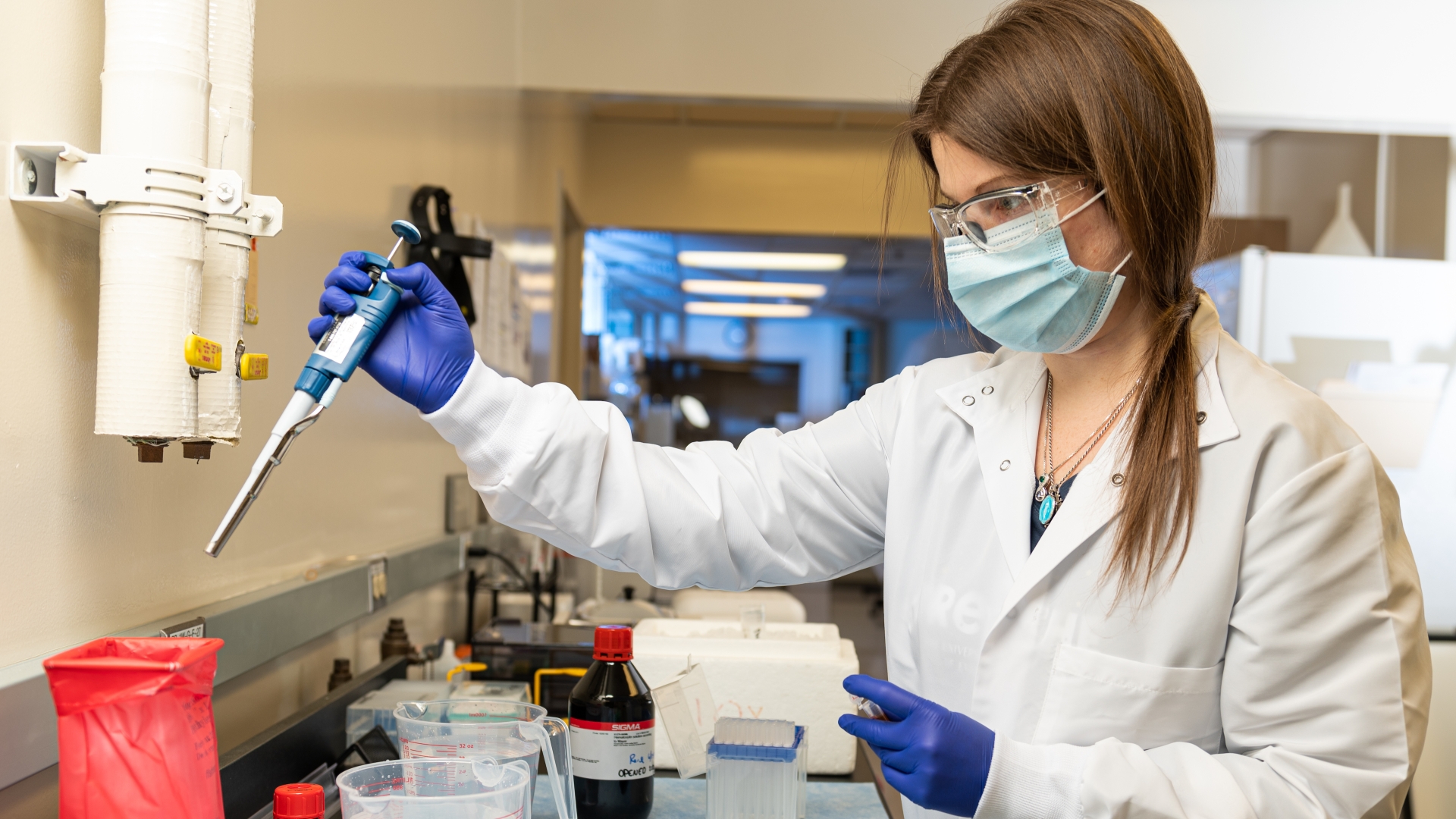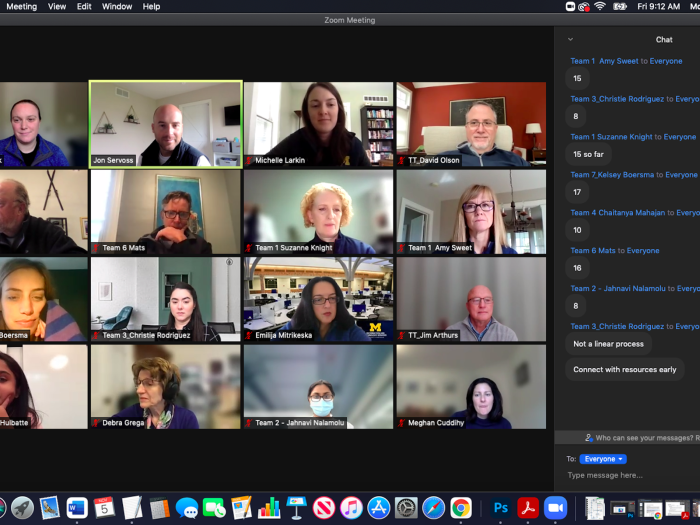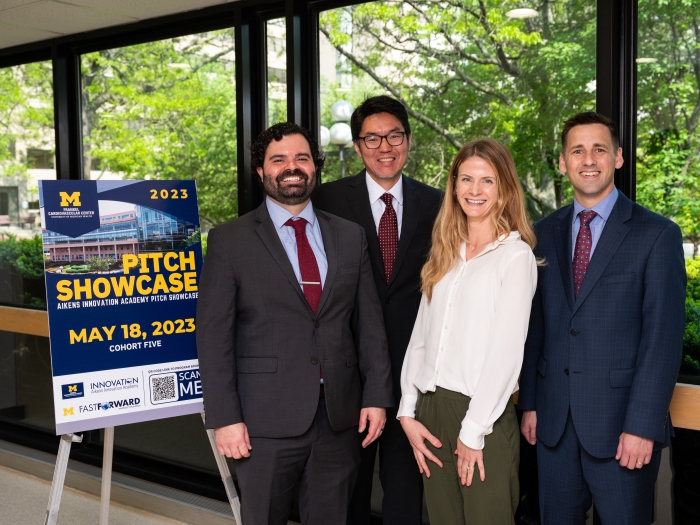We are committed to offering state-of-the-art technology and expertise through centralized cores and services that adapt to the ever-changing research landscape.

The Biomedical Research Core Facilities (BRCF) at the Medical School offer state-of-the-art instruments, resources, and expertise to investigators at the U-M and beyond. Many of our biomedical cores are recognized nationally and internationally for enabling new research and developing novel techniques for their respective scientific fields. The Biomedical Research Core Facilities include:
- Advanced Genomics Core - the largest sequencing facility in the Midwest
- Bioinformatics Core - offers custom support in computational methods and algorithm development
- Biomedical Research Store - researchers can purchase thousands of products for their projects
- Epigenomics Core - prepares samples for analysis in epigenetic regulation
- Flow Cytometry Core - offers instrumentation, phenotypic analysis, cell sorting, and data analysis
- Metabolomics Core - offers state-of-the-art in-house metabolomics analysis tools
- Microscopy Core - offers high resolution microscopy, instruments, services, and data analysis
- Proteomics & Peptide Synthesis Core - provides custom sample prep and data interpretation
- Proteomics Resource Facility - state of the art instruments, technical expertise, advanced informatics support
- Transgenic Animal Model Core - internationally recognized expertise in rodent models
- Vector Core - in-house viral and plasmid stocks are ready the next business day
For more information, visit the BRCF website.
Cores are centralized facilities or labs that offer shared services, shared equipment, resources and expertise to investigators and their teams on a fee-for-service basis. There are over 100 different cores supporting research across the University of Michigan. For more information, view the full list of Research Cores.
Clinical Trials Support Units (CTSUs) are business units that partner with investigators and their teams to ensure the timely and efficient activation and execution of clinical trials at Michigan Medicine.
The CTSUs allow investigators to focus on their research and patients, instead of administrative tasks. CTSUs use a standard set of work guides to harmonize elements across the clinical research enterprise while allowing for local flexibility to reflect the uniqueness of various types of research. CTSUs provide mandatory pre-/post-award support and optional study coordinator support.
When working with the Support Units, the six non-oncology units are referred to as M-CTSU and oncology as O-CTSU. Learn more about each Clinical Trials Support Unit.
Principal Investigators can ultimately find a smoother process and save time by taking advantage of the Clinical Trials Support Office's study coordinator pool, which can provide investigators with team members who are already on staff and fully trained. All CTSU study coordinators are Good Clinical Practice (GCP) trained, and many coordinators have obtained or are working towards becoming either Society of Clinical Research Associates (SOCRA) or Association of Clinical Research Professionals (ACRP) certified. The study coordinator services span the entire scope of clinical trial study coordination. For more information, visit the Study Coordinator Support page.
The Science Coordinator is an evolving role with roots in the science liaison role from industry. This service offers a great resource to study teams in clinical research: adjunct study team member, Angie Lyden (alyden@umich.edu), who can help with infrastructure logistics, and serve as a mentor and guide for early-career investigators and staff. Angie will work with study teams as an invested partner to navigate the new era of clinical research here at Michigan Medicine. For more information, visit the Study Coordinator Support page.
The Michigan Clinical Research Unit (MCRU), part of the Clinical Trials Support Office, provides clinical staff, resources, and infrastructure that are necessary to conduct adult and pediatric human clinical research protocols at the University of Michigan. MCRU offers the following services:
- RN Nursing
- Clinical Support
- Laboratory Processing and Shipping
- MCRU Space
- Mobile Clinical Research Team (MCRU2U)
The Medical School Office of Research has partnered with the School of Public Health to offer MM investigators statistical support for large-scale clinical trials, tapping into the expertise of the Statistical Analysis of Biomedical and Educational Research (SABER) Group, a unit of the Department of Biostatistics.
SABER offers a variety of support options for investigator-initiated multi-site trials, including study design, data and project management, clinical monitoring, and even development of customized apps for clincial studies.
MICHR, partnering with the Clinical Trials Support Office, offers a number of resources for clinical trialists, including:
- Pilot awards
- IND/IDE application preparation and submission
- Database development
- Participant recruitment and retention consultation
The Medical School Office of Research and the Michigan Institute for Clinical & Health Research (MICHR) have developed a team to ensure that researchers across the U-M Statewide Network of Care are supported in extending clinical research opportunities to patients, while also adhering to the unique administrative and regulatory requirements that are needed when working across affiliated and collaborating sites.
Learn how to get started in conducting clinical research at a U-M Health Statewide Network of Care location.
The Research Pharmacy is located in the central pharmacy area in University Hospital level B2 (room UHB2 D400). Pharmacists and technicians are dedicated to the coordination of drug studies and the dispensing of investigational drugs to inpatients and outpatients.
The Michigan Institute for Clinical & Health Research (MICHR) offers many services related to participant recruitment. They can help you:
- Determine whether their engaged participant registry, UMHealthResearch.org is an appropriate recruitment tool for your study and, if it is, teach you how to maximize the potential of UMHealthResearch.org for your study.
- Develop and review recruitment materials, identifying obstacles that may affect participant recruitment for your study through a participant recruitment and retention consultation.
The Data Office for Clinical & Translational Research and the Central Biorepository partner to help researchers gain secure access to thousands of available biospecimens and 15 years of patient clinical data. The intersection of these two services can help accelerate more targeted research, increasing your opportunities for collaboration, funding, and publication.
Data access through the Data Office for Clinical & Translational Research:
The Data Offices offers multiple self-serve tools, or you can request a custom data extract from their experienced programmers.
Biospecimen access through the Central Biorepository:
The Central Biorepository can connect you with thousands of biosamples for your research. For more information, visit their Get Access page, or view a sampling of what is available visit their Inventory page.
Data Office for Clinical & Translational Research consultations provide information on available data tailored to your needs and a deep dive into all patient health data resources that are available. From support for your new funding proposal to informing your study design to crafting limited patient data searches, they offer consultations to help with all of your data requests.
Central Biorepository consultations connect you with experts who can help with guidance on consent, IRB applications, and distributions agreements, whether accessing or storing biosamples.
The MiChart Research Team assists with all aspects of the electronic medical record including recruitment, ordering, and tip sheets. The Team can help you with setting up recruitment alerts, order set development, study and reporting needs, and other ways to maximize patient records for research.
There are two main types of MiChart-Research access: View Only access (which allows users to view virtually everything in MiChart) and Study Coordinator access (which allows for users to write to patients’ charts in the form of a research note and to place orders). The easiest way to request any of the services provided is to submit a Service Request via ServiceNow or contact Health Information Technology & Services (HITS) at 734-936-8000.
The Central Biorepository serves as a central storage facility, point-of-research access, and administrative hub for research using biospecimens and data associated with or derived from them.
The repository is populated through partnerships with investigators, departments, centers, and institutes that are looking to create a resource for their own use, as well as sharing biomaterials and developing collaborative opportunities within the research enterprise at the University of Michigan and beyond.
Are you a clinician researcher considering options for storing your patient samples? Accredited by the College of American Pathologists, the Central Biorepository's expert staff can help you collect, manage, and protect your biospecimens using highly-automated processes and the highest-quality control. For more information, visit their Biobank page.
The Health Information & Technology Services (HITS) department supports the IT needs of our research enterprise. In addition to oversight of enterprise-wide services such as MiChart, the IT team provides lab support, informatics, and high-end computing and data storage to help investigators leverage technology and data in ways that make meaningful contributions to research.
The Research Computing Package (RCP) offers computing services and data storage at no cost to Michigan Medicine faculty. RCP encourages faculty researchers to maximize the impact of their scholarly work through centralized, worry-free computing services and data storage. These services are offered in partnership with Advanced Research Computing – Technology Services.
The HITS managed computing service offers options for your PC and Mac general computing devices that help ensure your computer has the most up to date security and software updates, and device management features.
The Electronic Research Notebook (ERN) is a Software as a Service tool that provides a secure and compliant replacement for traditional paper lab notebooks. As modern research and lab data is largely digital and not well managed by paper notebooks, a software tool is a much better suited solution to the problem of managing modern research and laboratories.
The SignNow service at U-M supports the automation of processes for requesting and capturing signatures and information on documents. This service is used to support a diverse set of document workflows, some system-supported (automated) and some that had been manual. In addition, the U-M ITS e-signature service provides enabling support that includes single sign-on (SSO) access, SignNow service administration, contract and vendor management, and support and training.











